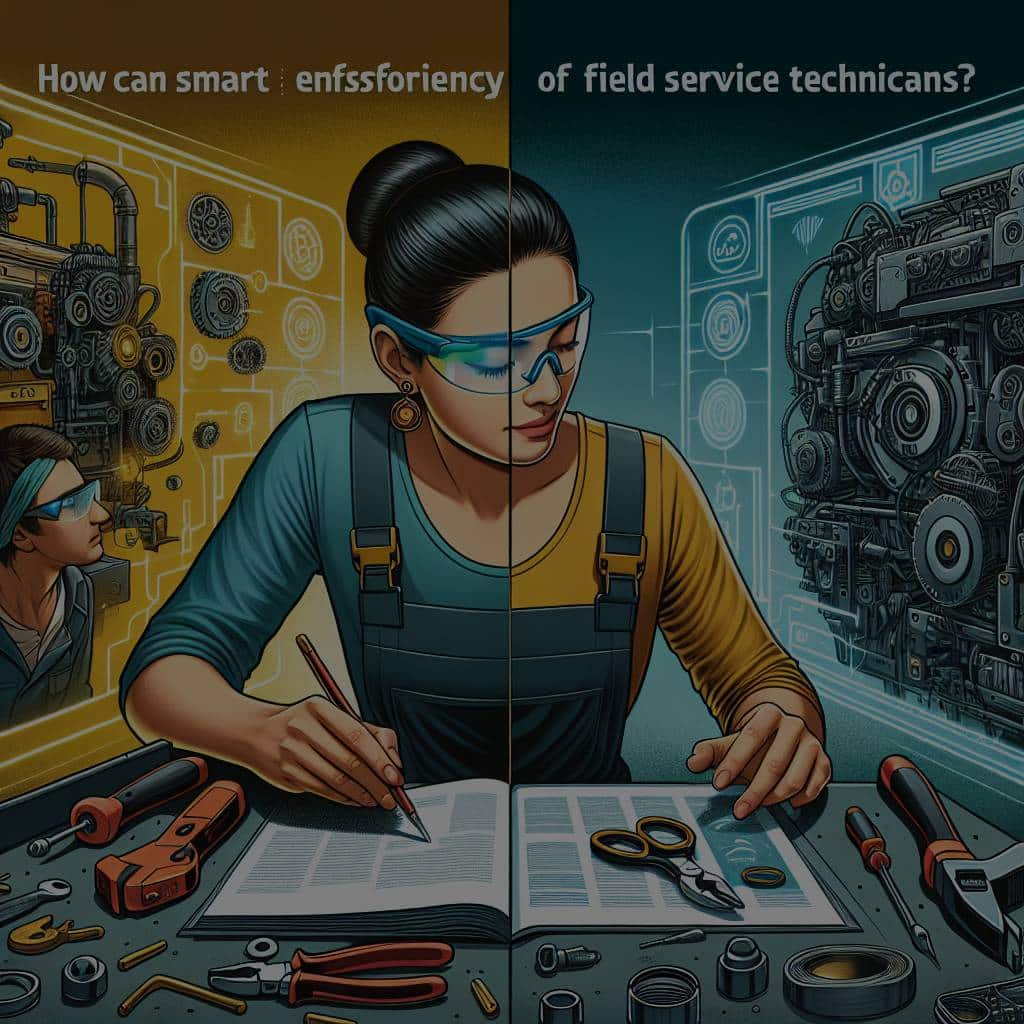As technology continues to evolve at a rapid pace, the role of field service technicians is undergoing a seismic shift. Traditionally, these workers used manual tools and techniques to complete their jobs. However, the advent of smart glasses and other wearable technologies has the potential to inject efficiency into their day-to-day operations that was previously unattainable. This article will delve into the transformative power of smart glasses and how they can enable field service technicians to work smarter, not harder.
Real-Time Data Access with Augmented Reality
One of the most significant benefits of smart glasses is their ability to provide real-time data access via augmented reality. This technology overlays digital information on the real world, providing technicians with instant access to crucial data.
Also to discover : How Is AI Being Used to Optimize Urban Waste Collection Routes?
Imagine a technician servicing a complex piece of equipment. With smart glasses, they will no longer need to refer to bulky manuals or call in for assistance. Instead, the detailed schematics, tutorials, and troubleshooting guides can be projected right before their eyes. This minimizes downtime and reduces the potential for errors, significantly improving their efficiency.
Moreover, augmented reality can provide real-time analytics, such as equipment performance, usage statistics, and predictive maintenance alerts. This empowers technicians to make informed decisions on the spot, enhancing their problem-solving abilities and ensuring optimal equipment performance.
This might interest you : What’s the Impact of 5G on Remote Control of Heavy Machinery in Construction?
Remote Assistance and Collaboration
Smart glasses bring another powerful capability to the table – remote assistance. Field service technicians often find themselves working in remote locations or dealing with unfamiliar equipment. In such scenarios, these wearable devices can connect them with experts located anywhere in the world.
Through live video feeds and shared virtual workspaces, technicians can collaborate with their colleagues or superior officers in real-time. They can receive guidance, second opinions, or even hands-on assistance from experts, all without leaving the job site. This eliminates the need for travel, expedites the resolution of complex issues, and dramatically reduces service times.
Improved Training and Skill Development
Training is a critical aspect of field service management. Yet, it can be challenging to provide comprehensive training that covers the wide range of equipment and scenarios that technicians may encounter. That’s where smart glasses come into play.
Trainees can wear smart glasses during their training sessions, capturing their first-person view. Trainers can then review these recordings to provide direct feedback and personalized instruction. Furthermore, augmented reality can be used to create interactive training modules, allowing trainees to practice on virtual equipment before they handle the real thing.
In the field, technicians can use the glasses to record their work, creating a valuable library of real-world case studies. These can be used for future training, helping new technicians learn from the experiences of their peers.
Enhanced Maintenance Management
Maintenance is a core responsibility of field service technicians. Smart glasses can revolutionize this aspect of their work through advanced features like augmented reality overlays and real-time data feeds.
For instance, a technician could use smart glasses to scan a piece of equipment, with the glasses identifying the make and model, and pulling up its maintenance history, current status, and any pending service requests. This makes it easier for the technician to diagnose problems, predict potential issues, and perform necessary maintenance tasks.
Moreover, smart glasses can guide technicians through complex maintenance procedures, providing step-by-step instructions overlaid on their field of view. This can significantly reduce the time required to complete maintenance tasks and improve the quality of the work.
Optimized Workflow and Field Service Management
Finally, smart glasses can help to optimize the entire workflow of field service management. With these devices, service requests can be handled faster and more efficiently. When a service call comes in, the details can be instantly sent to the technician’s glasses. The technician can review the information, accept the job, and get directions to the location, all without taking their hands off their work.
Moreover, smart glasses can integrate with field service management software, updating job statuses in real-time, and providing a more accurate picture of the technician’s workday. This can help to optimize scheduling, improve resource allocation, and provide better service to customers.
In the end, the implementation of smart glasses in the field service industry is not just a passing trend. It’s a powerful tool that delivers tangible benefits, ranging from improved efficiency and productivity to enhanced training and maintenance management. With their potential to transform the way field service technicians work, smart glasses are undoubtedly here to stay.
Safeguarding Customer Service Quality
In a world where customer service quality is instrumental for business success, it’s vital for field service technicians to meet and exceed customer expectations. Smart glasses can play an instrumental role in this aspect by improving service quality and customer satisfaction.
Nowadays, customers demand fast and efficient service. With real-time data access, smart glasses enable technicians to diagnose and fix issues more rapidly, reducing machine downtime and improving service operations. The less time a customer spends waiting for a resolution, the higher their satisfaction levels.
Furthermore, the remote assistance feature of smart glasses allows technicians to access expert help promptly, ensuring the accuracy of their work. This not only saves time but also builds trust with customers, as they can be confident that they’re receiving top-quality service.
Another noteworthy benefit is that smart glasses let technicians work hands-free. They no longer need to juggle tools and manuals, which can boost their productivity and enhance the professionalism of their service. Ultimately, this efficiency and attention to detail can significantly improve the customer’s experience, increasing customer loyalty and fostering long-term relationships.
The Future of Field Service Industry
The integration of smart glasses into the field service industry represents a significant leap in digital transformation. This wearable technology offers myriad benefits that can radically improve the efficiency of field technicians and redefine service management as we know it.
As we look ahead, it’s clear that smart glasses will become an indispensable tool for field service technicians. Their ability to overlay real-time information onto the physical world through augmented reality, offer remote assistance, and facilitate hands-free operation will continue to enhance service operations on all levels.
Moreover, the role of smart glasses in facilitating predictive maintenance cannot be overstated. With instant access to equipment’s operational stats and potential malfunctions, technicians can conduct proactive maintenance, preventing costly equipment failures and service disruptions.
Finally, the inherent connectivity of these devices will further optimize service management. By integrating with field service software, they allow for real-time updates of job statuses, improved resource planning, and better customer communication.
In conclusion, the advent of smart glasses in the field service industry signifies more than just a shift in technology. It heralds a new era of extended reality, transforming the way service technicians work and interact with their environment. As the world continues to embrace digital transformation, it’s clear that smart glasses are set to become an integral part of the field service industry’s future landscape.











